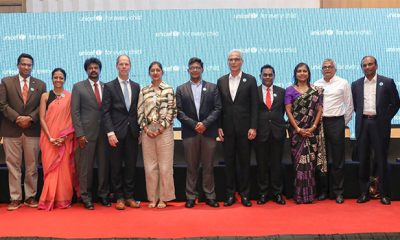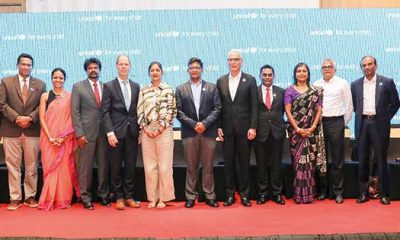Business
Developing plans and policies without young people is a futile exercise: UNICEF Sri Lanka

Series of crises SL has faced have dealt a heavy blow
Reviving presents SL with an opportunity to address its long-running challenges
by Sanath Nanayakkare
Young people are not only the present but also the future; developing plans and policies without them is a futile exercise, they need to be the front and centre of the discussions because they are the ones with fresh ideas and the most at stake, in terms of the sustainability of the planet and the tourism sector, Christian Skoog, Representative, UNICEF Sri Lanka said in Colombo yesterday.
“Here in Sri Lanka, we have a gift. That gift is the 4.4m young people. The contribution young people can make to the tourism sector is immense. But to harness their energy and ideas, there is a need to provide them the skills, training and opportunities to thrive within a dynamic and fast-growing industry,” he said.
“Across the world it is young people who are the hungriest for travel. They are seeking new experiences and looking to broaden their horizons. They serve not only as your potential clientele, they are also your best marketers through tools like social media. Indeed, Sri Lanka has been named one of the world’s most instagramable locations,”
“Rarely has there been such an urgent moment for us to ensure the energy and enthusiasm of young people to contribute to Sri Lanka’s sustainable development is given expression. And rarely has there been such an opportune moment to discuss building back better in the context of sustainable tourism.
Skoog made these points at an event hosted by the Chamber of Tourism and Industry held to mark the World Tourism Day.
Further speaking he said:
“Today we consider how to sustainably revive a sector upon which the livelihoods of so many people depend and we discuss how we can effectively respond to the challenges that confront us. When I learned in late 2020 that I would be appointed to serve as UNICEF Rep in Sri Lanka, I felt invigorated by the prospect of coming. Of course, much of that vigour was related to the work I expected to undertake here. But I confess that part of my excitement came from listening to my friends saying it is “paradise” and “best vacation spot”. Whenever I have had the opportunity to explore Sri Lanka since, I have been captivated by the landscapes, the biodiversity, the food, and the warmth of the people I meet across this island. But of course, I also arrived at a time of profound economic hardship for so many. I know those impacts have been felt deeply across the tourism sector. Many of you have struggled valiantly to keep your businesses running, and to maintain decent livelihoods for workers across the sector: from hoteliers to taxi drivers to souvenir sellers, to tour guides, to wait staff.”
“Sri Lanka’s tourism sector has contended with a succession of adverse events in the past 3 years: 1) The devastating terrorist attacks of Easter 2019 reduced arrivals by 18%. 2) COVID-19 crisis shut borders & paralysed air travel. 3) Conflict in Ukraine entirely cut a tourism market that until recently represented 25% of foreign arrivals. And, of course, economic crisis continues to pose an array of challenges. Reviving tourism in a manner that is sustainable and inclusive is one of the key tools to help us navigate through this crisis.”
“I would like to reiterate the importance of sustainable tourism in Sri Lanka, to touch upon the relationship between sustainable tourism and the SDGs, and mention the role young people can play as we re-think tourism in Sri Lanka.”
“Tourism is a critical component of the economy; it is Sri Lanka’s 3rd-largest source of foreign exchange, and contributed about 5% of GDP, pre-COVID. Tourism is also a major employer of people across the island. In fact, globally, tourism employs one in every ten people.”
“Let’s be under no illusions. The series of crises SL has faced have dealt a heavy blow. But the task we now face in reviving the sector also presents us with an opportunity to address some its long-running challenges.”
“These include over-tourism and other unsustainable practices; contributions to Climate Change; pollution; a loss of biodiversity; and a lack of inclusion. As an island nation with extraordinary biodiversity, Sri Lanka is particularly vulnerable to the adverse effects of unsustainable tourism.”
“Indeed, when tourism arrivals plunged during the pandemic, many destinations took the opportunity to reflect on the toll irresponsible or unsustainable practices had on their ecologies; and they resolved to do this differently. We too, should resolve to do things differently.”
“As tourism returns, the demand for ethical and sustainable products and experiences continues to rise. We can no longer consider sustainable tourism offerings as a choice. Costs incurred in adopting practices that benefit the environment and community, need to be looked at as investments which provide the industry with an advantage.”
“The tourism sector, as a whole, needs to focus on marketing Sri Lanka as not only a desirable destination because of its natural beauty, culture and heritage, but also differentiating it as a sustainable destination.”
“I believe that harnessing tourism’s positive contribution to sustainable development and the mitigation of the sector’s adverse effects calls for strong partnerships and decisive action by all tourism stakeholders.”
“Events like this give us an opportunity to build partnerships: to reflect, and to share ideas and strategies. Creating true partnerships of both public and private sector operators in the country is key to our ability to revive the sector and develop sustainable tourism as a tool for a better future for Sri Lanka.”
“With the right safeguards in place, tourism can provide decent jobs, particularly for young people, it can inspire us to protect life on land and life below water, it can help build resilient, gender-equal, inclusive economies and societies that work for everyone. And it can help Sri Lanka thrive,” the UNICEF representative said.
Business
Ceylon Tea conquers Libya: Exports leap 416%

In a world where every strong cuppa tells a unique story, Sri Lanka’s famed Ceylon Tea continues to carve its legacy – one cup at a time. The latest tea export figures for March 2025 reveal a tale of resilience, with total shipments rising to 23.43 million kilograms, up from 21.25 million kgs the previous year.
But the real headline is; Libya’s staggering 416% surge in Ceylon Tea imports – marking a bold new chapter in Sri Lanka’s tea trade. While traditional markets like Iraq and Russia held steady, Libya emerged as the ‘breakout star’, importing 5.31 million kgs in the first quarter of 2025 – a jaw-dropping leap from just 1.03 million kgs in 2024.
This explosive growth signals a burgeoning demand for Sri Lanka’s premium leaves in North Africa, where the rich, aromatic flavors of Ceylon Tea are winning hearts and palates.
Quadrupling Libya’s appetite for Ceylon Tea even in challenging global markets, is reflecting the fact that Sri Lanka’s tea can find loyal fans in evolving markets.
However, while the export values shine in USD terms, the rupee value of tea exports dipped slightly – a stark reminder of currency fluctuations impacting export earnings. Yet, the broader trend remains positive for Ceylon Tea, with cumulative exports for Q1 2025 reaching 63.21 million kgs, up from 62.33 million kgs last year.
Key markets like Iraq (+7%) and Chile (+41%) showed strong growth, while Russia and the UAE saw mild declines. Meanwhile, Tea Bags and Instant Tea have posted gains even in rupee terms – marking a bright spot in an otherwise mixed landscape, where Tea in Bulk and Green Tea segments have witnessed a decline against the same period of the previous year.
On the production front, tea production for the month of March 2025 totalled 24.43 M/Kgs, showing an increase of 4.86 M/Kgs vis-à-vis 19.57 M/Kgs of March 2024. All elevations showed an increase in comparison with the corresponding month of 2024.
“As Sri Lanka’s tea industry navigates global headwinds, the increase in production and Libya’s soaring demand could offer a breather,” analysts said.
(Source: Forbes & Walker Pvt Ltd, Sri Lanka Customs, Central Bank of Sri Lanka)
By Sanath Nanayakkare
Photo Credit: Sri Lanka Executive Aviation Services
Business
Fits Retail and Abans unveil exclusive DeLonghi Premium Coffee experience

In a groundbreaking collaboration set to transform Sri Lanka’s premium coffee landscape, Fits Retail has partnered with retail giant Abans PLC to showcase the iconic DeLonghi coffee machines at two of Colombo’s most prestigious locations: Abans Elite Colombo 3 and Abans Havelock City Mall showrooms.
This exclusive partnership presents a rare opportunity for coffee aficionados to experience firsthand why DeLonghi has become synonymous with coffee perfection worldwide.
With a heritage spanning over 100 years, DeLonghi proudly holds the title as the number one coffee machine brand in more than 46 countries, celebrated globally for its exceptional quality, innovation, and unrivaled Italian craftsmanship. Fits Retail’s collaboration with Abans PLC brings these legendary machines directly to Sri Lankan coffee enthusiasts, creating immersive experience zones designed to elevate everyday coffee moments into extraordinary rituals.
At these dedicated demonstration zones, visitors can discover the unparalleled precision engineering and user-friendly technology that have made DeLonghi machines the preferred choice for discerning coffee lovers in more than 46 countries worldwide.
Business
Ceyline Group and Lion Brewery Forge a Sustainable Future with Eco-Friendly Warehousing and Distribution.

Ceyline Total Solutions, the end-to-end logistic solutions provider of Sri Lanka’s leading maritime and logistics group Ceyline, has built Lion Brewery’s first sustainability-focused warehousing and distribution center in just 100 days.
Located in Tangalle, the facility reflects a strong commitment to environmental responsibility. Half of the structure is made from repurposed shipping containers, reducing both waste and carbon emissions. The project, executed by Ceyline’s brand for sustainable living spaces “Out of the Box” features interior fittings made from recycled and reused brewery waste materials, maximizing sustainability and cost efficiency. Ceyline also has already applied for CEB approval to install solar power for the facility to ensure its operation is powered by clean and green energy.
Lion Brewery will further its mission for an efficient and eco-friendly supply chain by incorporating elements such as electric forklifts, rainwater harvesting, and energy-efficient lighting.
This collaboration not only delivers a pioneering green logistics facility but also sets a new benchmark for sustainable warehousing in Sri Lanka. It showcases the power of collaborative innovation in driving responsible industrial development.
Kaveen Gayathma, Senior Vice President (Outbound Logistics) of Lion Brewery, added, “This project further strengthens our distinctive ‘route-to-market’ approach. Our collective efforts in conceptualizing,
drafting, and crafting have culminated in the creation of a truly one-of-a-kind model. The company’s unwavering commitment to environmental stewardship and sustainability is clearly demonstrated here, all while achieving our strategic objectives in a practical and cost-effective manner.”
-

 Business6 days ago
Business6 days agoDIMO pioneers major fleet expansion with Tata SIGNA Prime Movers for ILM
-

 News5 days ago
News5 days agoFamily discovers rare species thought to be extinct for over a century in home garden
-

 Foreign News6 days ago
Foreign News6 days agoChina races robots against humans in Beijing half marathon
-

 Features3 days ago
Features3 days agoRuGoesWild: Taking science into the wild — and into the hearts of Sri Lankans
-

 Editorial6 days ago
Editorial6 days agoSelective use of PTA
-

 News3 days ago
News3 days agoOrders under the provisions of the Prevention of Corruptions Act No. 9 of 2023 for concurrence of parliament
-

 Features4 days ago
Features4 days agoNew species of Bronzeback snake, discovered in Sri Lanka
-

 Features5 days ago
Features5 days agoThe ironies of history
















